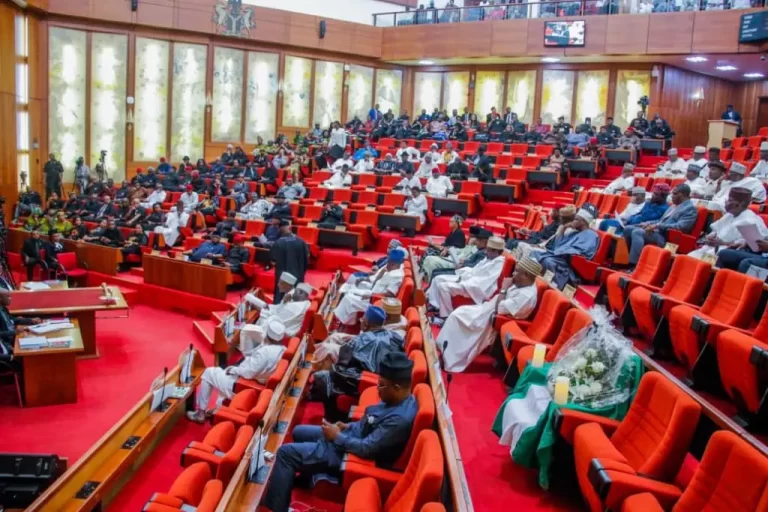The Resource Centre for Human Rights and Civic Education (CHRICED) has raised alarm over the widening rift between Nigeria’s two legislative chambers, warning that the ongoing deadlock poses a serious threat to democratic governance and effective lawmaking in the country.
In a statement signed by its Executive Director, Dr. Ibrahim M. Zikirullahi, CHRICED condemned the House of Representatives’ decision to suspend consideration of all Senate-sponsored bills, following the Senate’s failure to act on 146 bills passed by the lower chamber.
On Wednesday, July 2, the House of Representatives unanimously adopted a motion halting deliberations on bills originating from the Senate, citing long-standing delays by the upper chamber.
“The institutional standoff, if left unresolved, threatens to paralyze Nigeria’s legislative process and erode public confidence in democratic governance,” Dr. Zikirullahi said.
READ ALSO: CHRICED Gives Wike 7 Days to End FCT Workers’ Strike or Resign
CHRICED described this development as a “grave dereliction of legislative responsibility,” especially given the country’s pressing socio-economic challenges.
Dr. Zikirullahi expressed concern that both chambers appear more eager to pass executive-sponsored bills—often with little scrutiny—while consistently ignoring bills initiated by citizens and civil society groups.
“It is particularly troubling that while both chambers expedite executive-sponsored bills, they consistently neglect citizen-driven legislation,” he stated.
Among the neglected bills cited by CHRICED are the Employee Remuneration Protection and Unpaid Wages Bill, Gender Representation Bill, Whistleblower Protection Bill and Sexual Harassment in Tertiary Institutions Prohibition Bill.
“These outlined bills are not frivolous proposals,” Zikirullahi emphasized. “They speak directly to the challenges ordinary Nigerians face, yet many have languished in the chambers for years without progress.”
According to CHRICED, the contrast in legislative treatment is glaring. While 26 executive bills were passed in the Senate between 2024 and 2025, the House processed 12, with 9 passed.
READ ALSO: Workers Are Not Beggars, Pay Them A Living Wage, CHRICED Tells FG, States
One of the most notable among these was the controversial tax reform legislation, which sailed through with “remarkable speed and little resistance.”
CHRICED also took aim at lawmakers for showing rare unity only when approving constituency projects in the national budget—an act the group labeled “unconstitutional and self-serving.”
Zikirullahi further criticized the legislature’s bloated size and high operating costs, noting that despite the immense public resources allocated, “there are no measurable benchmarks for performance or accountability.”
Unicameral Legislature the Way Forward
In response to the ongoing impasse and the wider inefficiencies it represents, CHRICED renewed its call for a unicameral legislature in Nigeria.
“The current bicameral structure—comprising 469 federal lawmakers—has proven to be inefficient, costly, and prone to rivalry,” said Dr. Zikirullahi. “A single-chamber legislature will eliminate inter-chamber conflicts, streamline the process, reduce cost, and promote accountability.”
He cited global examples of successful unicameral systems in countries like Ghana, Finland, Taiwan, Tunisia, and Zambia—all of which operate with far fewer legislators than Nigeria.
As the country looks toward the July 2025 National Constitution Summit, CHRICED is urging civil society groups, media, professional bodies, traditional leaders, and everyday Nigerians to prioritize this issue on the national reform agenda.
“A shift to a unicameral legislature would simplify legislative oversight, enhance citizen engagement, and refocus the National Assembly on the people’s interests—not political turf wars,” Zikirullahi argued.
CHRICED also issued a direct call to Senate President Godswill Akpabio and House Speaker Tajudeen Abbas to resolve the standoff without delay and push forward on long-delayed, people-oriented legislation.
READ ALSO: CHRICED Demands Justice In Guzape Land Fraud Scandal, Accuses IGP Of Shielding Suspect
“If they are unable to act in the national interest, they must seriously consider stepping aside for the sake of progress and democratic integrity,” Dr. Zikirullahi declared.
He also urged Nigerian citizens to hold their elected officials to account through consistent civic engagement and by voting for representatives who demonstrate responsibility and responsiveness.
“The time has come to demand a legislature that truly serves the people,” Zikirullahi said

